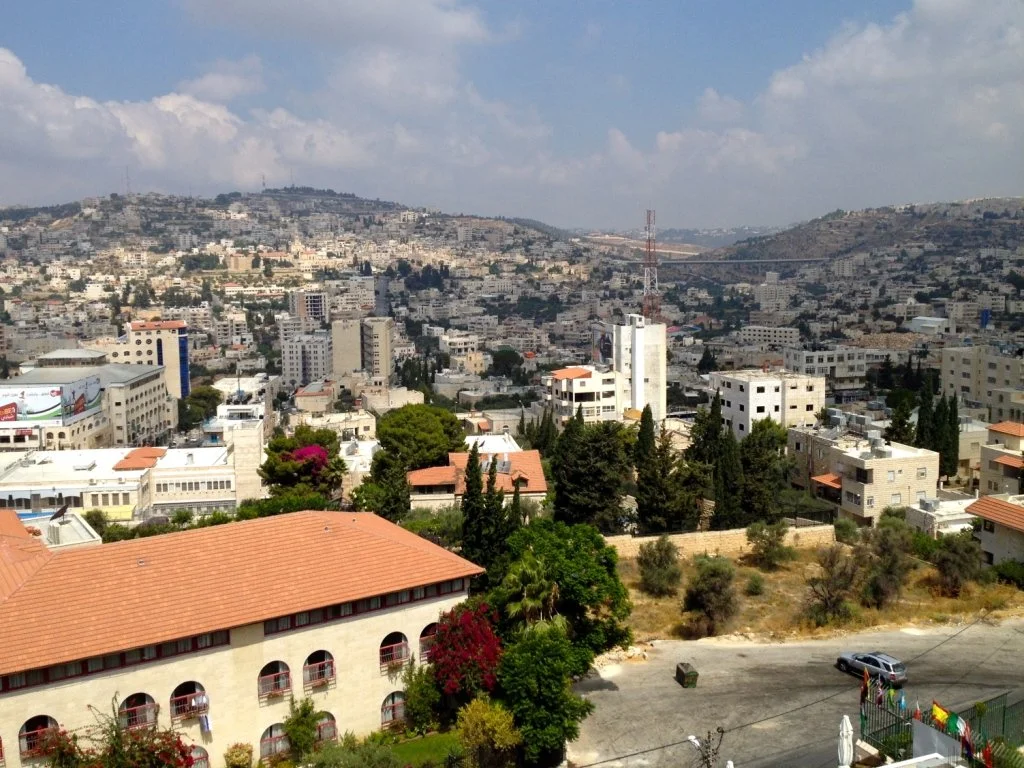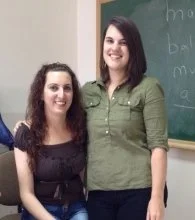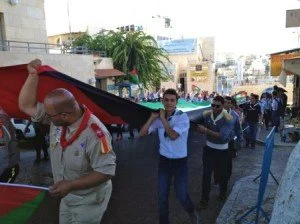July in Bethlehem
10-15-2014
By Mara Forster-Smith
In July of 2014, McCormick alum Mara Forster-Smith studied the Arabic language at Bethlehem University in Israel. During her time there, conflict broke out between Israel and the occupied Palestinian territories.
As my plane skidded to a halt on the tarmac at Tel Aviv’s Ben Gurion International Airport, my stomach lurched with nervous excitement. I was about to begin a whole month of learning and exploration in the Holy Land. Would all of the weeks of careful planning for Arabic courses in Bethlehem, living arrangements, and transportation pan out? I took a breath, and tried to relax. I told myself that whatever happens this month, I would learn and grow in the process, and that it would probably make for a pretty good story afterward. Looking back now, this could not have been more true.
Despite my initial jitters, I was eager for my month in Bethlehem to begin. Having traveled to Israel/Palestine for the first time in January 2014, I was motivated to return in order to learn more about this context so far away from home. It was my fifteen-day journey with McCormick’s J-Term travel/study seminar that opened my eyes to both the ancient biblical history that informs my Christian faith, as well as the current conflict between Israelis and Palestinians that has gripped the nation for more than half a century. Along with many of my fellow classmates, I was deeply moved by the first-hand accounts of the struggle from local leaders on all sides of the situation, and particularly from the Palestinian perspective. After returning home, I desired to establish further connections in Israel/Palestine, and in the future potentially engage in ministry partnerships with churches in this area of the world.
I carry with me a deeper understanding of the tension and uncertainty that so many people for whom the conflict directly impacts face on a daily basis.
I decided to apply to McCormick for funding to be able to return to Bethlehem in July following my graduation in May. My proposal was to gain more exposure and understanding through cultural immersion by studying Arabic at Bethlehem University. In May the McCormick faculty awarded me a grant from the “Robert and Jean Boling Memorial Fund for International Study and Travel” that would make my vision a reality. Feeling incredibly fortunate and grateful for this opportunity, I boarded my plane on June 27th and arrived the next day in Beit Sahour, the town adjacent to Bethlehem where I would be living for the next month. That afternoon, I met the Awwads, the family that would be leasing me an apartment, and they immediately welcomed me into their home for lunch. Their warmth and hospitality, so typical of my experience of Palestinians, became one of the highlights of my time in Bethlehem. The family members extended an open invitation for me to come practice my Arabic and to dine on delicious Palestinian food with them whenever I liked. Needless to say, I took them up on their offer several times.
That next week I started my Arabic classes at Bethlehem University. I would spend four hours each morning studying. In the afternoon my classmates and I would head out into the city together to apply the material we had just covered in the classroom in local restaurants, shops, supermarkets, and even the public swimming pool from time to time. I found learning the language itself, of which I had no prior knowledge, to be challenging. Yet because of the intensive nature of the course, and the full immersion context, I fairly quickly began to use the Arabic that I was learning. I noticed that even attempting to speak a few phrases set a positive impression and helped to forge connections with people around town that may not have been there otherwise.
The days began to pass quickly after I settled into my routine. However, I soon realized that the time I had chosen to visit Israel/Palestine turned out to be anything but stable. Just a few days into my trip, media sources broadcasted the news that the three Israeli teenagers who had gone missing in the West Bank in June had been found dead near the city of Hebron. As a result of this news, riots erupted in and around Jerusalem, and when a Palestinian youth was subsequently killed a few days later in East Jerusalem, the tension reached a breaking point. Bethlehem, while not at the center of the unrest, was not exempt from it. I noticed that by day, a surface layer of calm existed as people went about their regular business. The calm, however, would vanish each night to be replaced by the volatile sounds of rioting and sirens, which I could always hear around 1:00-2:00 am from my apartment as I lay wide awake.
Perhaps even more startling to me was hearing how this violence and hostility had become somewhat normal to many of the Palestinians I met. As the situation continued to escalate with Israel and the Gaza Strip exchanging missile attacks, Palestinian friends would tell me that they remembered similar events occurring throughout their lives, particularly during the Second Intifada in the early 2000’s. This view, however, did not cause people to become complacent. As the conflict wore on, I observed many efforts in Bethlehem to mobilize support and relief for Gazans through community fundraising events and gatherings. The concern on behalf of Palestinians in the West Bank to show solidarity with Palestinians in Gaza was quite intentional. One member of the Awwad family told me, “The Israeli government has tried to divide us in order to weaken us, but we are really one people, one nation, and we care seriously about each other’s wellbeing.”
Under these circumstances, visiting Israel/Palestine during such a tumultuous time in its history opened my eyes more than I ever anticipated to the realities of the ongoing conflict there. I carry with me a deeper understanding of the tension and uncertainty that so many people for whom the conflict directly impacts face on a daily basis. I carry with me my personal memory of fear, and heartbreak as the civilian death toll in Gaza rose steadily each day. I carry with me my friendships with Palestinians as well as my classmates from around the world, who each helped to stretch my assumptions of cultural difference in their own unique way. And now as I begin a chaplain residency program here in Chicago, I carry with me a renewed sense of God’s call in my own life to accompany the broken-hearted, to share what I have witnessed, and to engage in efforts to bring about peace, both in the global community as well as right here at home.
Mara Forster-Smith graduated from McCormick with her Masters of Divinity in 2014. She is now serving as a chaplain at Rush Hospital in Chicago. Featured Image is a photo Mara took of Bethlehem.
Mara Forster-Smith and Muna, her Arabic teacher at Bethlehem University
A typical lunch with the Awwads, Mara’s host family
A youth march for Gaza Relief that took place in Bethlehem mid July





